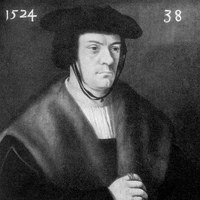Enrique Cornelio Agripa de Nettesheim

Cornelio Agrippa's main biographers coincide in describing him as a singular, paradoxical, controversial, surprising character. Philosopher, theologian, jurist, doctor, connoisseur of alchemy and kabbalah, wise in numerology and pharmacopoeia and archmage. Intrepid adventurer and tireless traveler, sometimes a soldier, sometimes a professor and lawyer, and sometimes a courtier of the powerful. Open-minded and seductive, but inconsiderate and satirical. Small in stature and endowed with an open and pleasant physiognomy. Admired by many disciples and friends with whom he founded a secret society dedicated to the practices of natural magic and alchemy, he was also criticized and accused of being a Jewish heretical by theologians of important universities due to his position in the face of the religious controversies of the time. his works on the hermetic tradition and natural magic. He also knew the persecution, the economic hardships, the complaints of his creditors and the jail. The details of his private life, his three marriages, his seven children, his interests and feelings until a few years before his death give a good account of the letters preserved in his Complete Works (Opera, Lyon, 1600 ¿?).
He wrote numerous works that first circulated in the form of copies and commentaries and that, although they did not see the light until many years later, they earned him the recognition and fame of a great scholar, sage, connoisseur of formidable secrets among the men of the Renaissance culture. . Among all his works, due to their importance and transcendence, it is worth mentioning at least three of them: De Nobilitate & praecellentia foeminei sexus, written in 1509 but not published until 1529, where following the wake of the works of Plutarco and Boccaccio , decides to go a step further to end up defending not only equality but the superiority of the female sex. De Nobilitate was imitated or directly plagiarized by the treatises that followed it in accordance with the tradition of the Querelle des femmes. For its part, De incertitudine et vanitate scientiarum et artium, atque excellentia Verbi Dei, declamatio invectiva (1530), is considered an exercise in skepticism against the arts and sciences of the time where the author makes a strong denunciation of the religious hypocrisy and social injustice that earned him criticism and persecution by the inquisition. Finally, De occulta philosophia libri tres (1533), is an important compendium of theology, Neoplatonic philosophy, hermetic tradition and natural magic, which would become a model and reference for many philosophers, among others and especially for Giordano Bruno.
Although most of his works were considered dangerous and heretical, they were reprinted and translated into the vernacular in numerous editions and continued to be published even well into the 18th century. Always surrounded by a certain halo of mystery and numerous legends, Cornelio Agrippa is also currently the object of interest by many scholars in the field of philosophy, religious humanism and women’s studies.

 +34 954 610 124
+34 954 610 124






